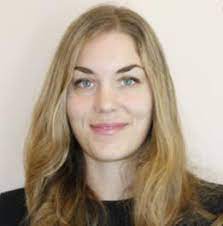Elli Ntakou Shares Advice, Previous Experience at CISE Industry Roundtable

Dr. Elli Ntakou, an Advisor at Quanta Technology and Boston University alum, spoke to CISE graduate students about her experience in both academia and industry at the CISE Industry Roundtable on March 19. During the roundtable, Ntakou spoke about her academic research, professional experiences in the optimization field post-grad, as well as recommendations for current students as they continue their studies.
Ntakou is a former student of CISE Affiliated Faculty Professor Michael Caramanis (ME, SE). Prior to attending Boston University, Ntakou completed her post-secondary education studying at the National Technical University of Athens in Greece, where she received a Diploma in Electrical and Computer Engineering. She then graduated from Boston University’s College of Engineering in 2017 with a Ph.D. in Systems Engineering, with a focus on optimization and distributed energy resources.
“My research was on the energy resources that are connected to the distribution side of the electric grid,” Ntakou explained. “Examples of such resources are electric vehicles and rooftop solar panels, and I studied how they can be optimally used to benefit the electric network through lower costs and higher efficiency.”
Ntakou’s current work at Quanta Technology directly relates to her previous research at Boston University. She works with a variety of clients, ranging from electric power utilities, developers, and banks on projects around energy markets and distributed energy resources, using optimization, data analytics and developing customized software and middleware tools for distributed energy resources.
“Not every day looks the same in tech consultancy,” Ntakou said. “Some days it’s writing code, sometimes it’s internal project management, or it’s engaging with a client and keeping them involved with the project’s timeline.”
Ntakou noted the question many students are faced after receiving their Ph.D.—does one continue work in academia, or switch to industry? She made the distinction that academia has more freedom for interest-based exploring. On the other hand, working in industry can give one more flexibility in terms of changing location or employer.
When asked what she would do differently if she could go back to school, Ntakou emphasized networking with a variety of individuals. “If you only connect with people who are in your direct field, you’re missing out on valuable connections,” she said.
Ntakou also suggested students don’t shy away, even if their research focus is a bit more niche or harder to understand. “You sometimes can start to think that you didn’t get as many questions or comments because your focus of research is not as catchy a topic and so you do not have to work on your presentation skills,” she said. “Had I realized you can make a presentation interesting and catchy no matter the content or audience, I would have improved my presentations earlier.”
Ntakou concluded by praising Boston University’s value. “Your work at Boston University is a huge point in your resume, you should be confident that your hard work is going to get your foot in the door where you should be,” Ntakou noted. “BU has a great name in the industry and provides you with a large network.”